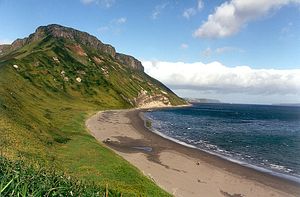On Monday, the Nikkei Asian Review reported that Japan and Russia were in talks over potentially sharing administration of the disputed Kuril Islands — part of a chain of islands that run from the northern coast of Hokkaido in Japan to the southern tip of Russia’s Kamchatka peninsula, separating the Sea of Okhotsk from the northern Pacific Oceans.
The report, which cited “Japanese and Russian government sources” cited the idea of jointly administering the territories as something proposed by Japanese Prime Minister Shinzo Abe during his visit to Russia in May 2016. The two leaders met in a relaxed environment at the Black Sea resort city of Sochi, with Abe emerging from the meeting heralding a “new approach” to the bilateral.
Abe has made no secret of wanting to resolve the long-standing dispute between Tokyo and Moscow over the Kuril Islands, which has persisted since the end of the Second World War. Just last month, he told Japan’s Diet that he will “resolve the territorial issue, end the abnormal situation in which no peace treaty has been concluded even 71 years after the war, and cultivate the major possibility of Japan-Russia cooperation in areas such as the economy and energy.”
Hours after the Nikkei reported its exclusive, Japan’s foreign ministry strongly denied that any such talks were underway. “We deny the Nikkei report that Japan and Russia are discussing the joint administration of the Northern Territories,” Yasuhira Kawamura, a spokesperson for the Japanese foreign ministry, told Reuters. “There is no change in Japan’s fundamental position that Japan will conclude the peace treaty with Russia by resolving the issue of the possession of the four northern islands.” Abe’s Chief Cabinet Secretary Yoshihide Suga also denied the report, according to the Japan Times.
Earlier in September, in an interview with Bloomberg, Russian President Vladimir Putin confirmed that talks were still ongoing between the two countries over the Kuril Islands. “We’re not talking about some exchange or some sale,” he said. “We are talking about finding a solution where neither of the parties would feel defeated or a loser.”
The Russian leader’s comments in that interview don’t necessarily contradict the Nikkei‘s report, but it’s hard to see how Abe would consider joint administration a satisfactory resolution of the dispute. Moreover, the political costs of tolerating a treaty-based solution that did not afford Japan full sovereignty of the islands will likely damage Abe’s position at home.
Despite the mixed signals over the seriousness of a joint administration agreement, Russia-Japan relations have also been colored by two broader geopolitical developments. The first of these is Russia’s isolation from the West following its annexation of Crimea and support for rebel groups in Eastern Ukraine beginning in early 2014. Japan, as a member of the G7 and a close U.S. ally, was forced to restrain its engagement with Moscow and initiate sanctions of its own, sharply reducing the momentum that appeared to exist in the bilateral in 2013, when high-level talks on the Kuril Islands dispute appeared to be moving along well.
The second development is Russia’s growing proximity to China. While the two powers remain far from allies, Putin’s isolation from the West has spurred a rapprochement with Beijing. Abe’s broader bilateral strategy for Russia, as a result, includes economic incentives meant to give Moscow pause before banding together with Beijing against Tokyo in the future. In an additional sign that the Abe government is getting serious about pursuing closer economic ties with Russia, the Japanese cabinet added a new post for Hiroshige Seko, minister of economy, trade, and industry, who will be focused on economic cooperation with Russia.
Above all, the most curious bit of the joint administration proposal is that there’s little in it that would be fundamentally appealing to Russia, which currently administers the entire chain of islands. As the American Interest observed, one of the problems bogging down talks over the Kurils is that “Abe wants this more than Putin does.” It is possible that something could have changed in the latest spate of Russia-Japan diplomacy that has been ongoing since the May 2016 Sochi meet. We’ll find out soon enough. Abe and Putin are slated to meet in mid-December in Japan.

































